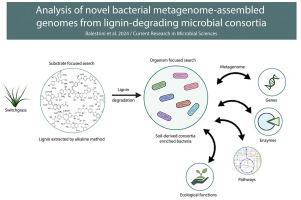木质素降解微生物联合体的新型细菌元基因组组装分析
IF 5.8
Q1 MICROBIOLOGY
引用次数: 0
摘要
尽管最近取得了一些进展,但人们对细菌降解木质素的情况还不完全了解。为了研究未知分类群的细菌降解木质素单体的机制,研究人员从富含能降解木质素的微生物的土壤源联合体中,对细菌元基因组组装基因组进行了功能分析。共回收了 232 个元基因组。按照基因组完整性至少达到 70%、污染小于或等于 10%的质量标准,共获得 39 个基因组。在这些基因组中,共有 14 个基因组来自分类学级别较低(即只分类到目或更高级别)的未知分类细菌,用于进一步的功能分析。首先对这些细菌的潜在生态功能进行了全面分析,然后对单木质素降解途径进行了详细分析。基因组数量最多的门类是蛋白细菌。除了降解纤维素、半纤维素和木质素等植物细胞壁成分外,这些基因组还具有与硫、氯、砷和碳循环相关的不同代谢能力,例如反硝化功能,与土壤衍生细菌的功能一致。Sphingomonadales_OP 08 基因组显示出降解纤维素和半纤维素的最大潜力,尽管它似乎不能降解木质素。放线菌_BY 70 基因组中与降解单木质素有关的酶和途径数量最多;此外,它还显示出通过不同裂变途径进行芳香环断裂的最大潜力。这两种放线菌的基因组显示了咖啡酸途径,咖啡酸是一种重要的酚类化合物,具有多种生物特性,如抗菌和抗氧化。据我们所知,这是这类细菌中首次出现这种途径。本文章由计算机程序翻译,如有差异,请以英文原文为准。

Analysis of novel bacterial metagenome-assembled genomes from lignin-degrading microbial consortia
Despite recent progress, bacterial degradation of lignin is not completely understood. To address the mechanisms that bacteria from unknown taxonomic groups use to perform lignin-monomer degradation, functional analysis of bacterial metagenome-assembled genomes from soil-derived consortia enriched for microorganisms capable of degrading lignin was performed. A total of 232 metagenome-assembled genomes were recovered. After applying quality criteria of at least 70 % genome completeness and contamination less than or equal to 10 %, 39 genomes were obtained. From these, a total of 14 genomes from bacteria of unknown classification at lower taxonomic levels (i.e., only classified to the order level or higher) were chosen for further functional analysis. A global analysis of the potential ecological functions of these bacteria was performed, followed by a detailed analysis of monolignol degradation pathways. The phylum with the highest number of genomes was Proteobacteria. The genomes presented functions consistent with soil-derived bacteria, like denitrification, with different metabolic capacities related to the sulfur, chlorine, arsenic and carbon cycles, in addition to the degradation of plant cell wall components like cellulose, hemicellulose, and lignin. The Sphingomonadales_OP 08 genome showed the greatest potential to degrade cellulose and hemicellulose, although it does not appear to be able to degrade lignin. The Actinobacteria_BY 70 genome presented the highest number of enzymes and pathways related to the degradation of monolignols; furthermore, it showed the greatest potential for aromatic ring breakage by different fission pathways. The genomes of the two Actinobacteria showed the caffeic acid pathway, an important phenolic compound presenting several biological properties, such as antimicrobial and antioxidant. To our knowledge, this is the first time this pathway has been reported in this class of bacteria.
求助全文
通过发布文献求助,成功后即可免费获取论文全文。
去求助
来源期刊

Current Research in Microbial Sciences
Immunology and Microbiology-Immunology and Microbiology (miscellaneous)
CiteScore
7.90
自引率
0.00%
发文量
81
审稿时长
66 days
 求助内容:
求助内容: 应助结果提醒方式:
应助结果提醒方式:


